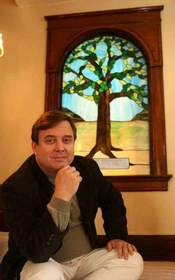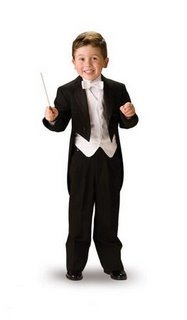
Winning Back Audiences for Classical Music

“We’ve lost at least a generation and a half,” said Kentucky Symphony Orchestra music director James R. Cassidy, speaking of the decline in concert attendance due to vanishing music education programs in the schools.
That’s why the KSO’s subscription season brochure reads “Great Music Transcends Generations…Let’s Play.”
That’s also why it features photos of a pint-size maestro (Cassidy’s four-year-old son Devlin) in white tie and tails, trousers spilling over the top of his shoes.

The KSO leader, who calls himself “half coach, half missionary,” is dedicated to bringing classical music to a wider audience.
The KSO mantra is to make classical music “attractive, accessible and affordable...”
One is tempted to add unpredictable, because there is no formula attached to what they do.
“The common denominator,” said Cassidy, “is quality repertoire. That’s the bottom line of everything.” But as always, the KSO difference will be how it’s presented.
During the 2007-08 season, the KSO will perform Mahler, Beethoven, jazz, an evening of opera and Leonard Bernstein’s “West Side Story.” But it will be opera with projected sets, Beethoven in the flesh and Latin jazz featuring a band of area all-stars. And each concert will have what Cassidy calls “a fun feature,” like samba lessons at intermission or Q & A’s with Beethoven.
“Look at the evolution of people’s workdays,” he said. “They bring work home. They need time with family. The things we used to do for extra have fallen by the wayside.” People feel “beat -- ‘I’m dead. All I want to do is veg. I don’t want to have to get dressed up and go back out.’”
Cassidy looked out at a KSO audience once and thought of folks visiting the aquarium. “I looked out at the audience and then I looked onstage. You’ve got your audience sitting there looking at your penguins. And you’ve got the penguins who are thinking ‘what the heck are they doing?’”
“The concert presentation as we know it is dead, gone, pull the plug,” he said. “We have to evolve the presentation of what we do and it needs to be drastic.”
Orchestras must fill the gap left by the absence of music education in the schools, he said. “It’s not doing more concerts. It’s being able to roll up your sleeves and get out and do the dirty work that needs to be done in the schools and the media.
“Announcing from on high, ‘you can’t lose this culture because it’s too wonderful…’ people won’t buy into that unless you can wrap your arms around them and get them to see it.”
The KSO season opens conventionally enough with Mahler’s Symphony No. 2 (“Resurrection”) at 8 p.m. Friday and Saturday in Greaves Concert Hall at Northern Kentucky University. However, you might be blinded by the reflected light from all those “Ga-ga for Gustav” buttons the chorus and players will be wearing. “It takes a little bit of the edge off,” Cassidy said (they will be offered to patrons at the door, too).
Cassidy wanted to hold the Mahler until a new concert hall is built in Northern Kentucky, he said. “Then I thought, ‘J.R. you could be waiting a long time.’ I wanted something with meat on the bone, so I said let’s just go ahead and do it. It’s going to be a tight squeeze on that stage (Greaves), but it’s a good opener.”
Regarding the jazz concert, “Ritmo de la Noche” (“Rhythm of the Night”) Nov. 9 and 10 at Greaves, I thought what don’t these jazz guys get to do? They get to do big band here and there, but the extended big band stuff that Stan Kenton used to do, you know add French horns and extra percussion.” KSO arranger Terry LaBolt may add a small string band “to give it some depth in some places,” Cassidy said.
On the program will be Johnny Richards’ “Cuban Fire Suite” (written for Kenton’s band) and Lalo Schifrin’s “Latin Jazz Suite.” (Schifrin wrote TV’s “Mission: Impossible” theme.)
Performing will be the area’s best studio and jazz players, including Rick van Matre at the University of Cincinnati College-Conservatory of Music, trumpeters Gary Winters and Greg Wing, trombonist Paul Piller and drummer John Von Ohlen.
A look at young Cassidy’s face on the KSO brochure (he’s covering his eyes) tells the story of “Twisted Sisters,” the KSO January program featuring soprano Amy Johnson as opera heroines with issues.
“It’s not for kids,” said Cassidy. Johnson will sing arias from Shostakovich’s “Lady Macbeth of Mtsensk,” Donizetti’s “Lucia di Lammermoor,” Boito’s “Mefistofeles” and Richard Strauss’ “Salome” complete with John the Baptist’s severed head.
The performance, which will travel to the Paramount Arts Center in Ashland, Kentucky Jan. 12, will mimic staged opera through the use of sets projected on downstage scrims and costumed dramatizations.
Beethoven will be in the house in April in the person of actor Troy Hitch. Hitch will react as Ludwig might if he could return and witness a contemporary performance of his music.
The KSO will oblige him with Beethoven’s Overture to “Creatures of Prometheus,” the Piano Concerto No. 5 (“Emperor”) and Symphony No. 7. Soloist in the “Emperor” Concerto will be pianist James Tocco.
“Troy is extremely creative and spontaneous. We haven’t sat down and figured out how it’s all going to happen, but once we start the juices flowing, we know that from one night to the next it will be completely different.”
“West Side Story,” which will close the KSO season in May, is 50 years old this season. The KSO has secured the rights to stage it as it has “Sweeney Todd” and “Evita,” with the orchestra upstage and the action semi-staged in front.
“This is going to be bigger than we’ve ever done because we’re going to do the whole choreography. It has an enormous cast, an enormous dance show. We may even have to build (the stage) out.”
Collaborating with the KSO will be the NKU department of theatre and dance led by Ken Jones. Major roles are to be announced.
The 2007-08 KSO season.
- Friday and Saturday. Mahler, Symphony No. 2 (“Resurrection”). Soprano Danielle Walker. Mezzo-soprano Brandy Lynn Hawkins. Cincinnati Choral Society, Clermont Festival Chorale and KSO Chorale. James R. Cassidy, conductor.
- Nov. 9, 10. “Ritmo de la Noche.” Ernesto Lecuona, “Malaguena.” Lalo Schifrin, “Latin Jazz Suite.” Johnny Richards, “Cuban Fire Suite.” Rick van Matre and Hal Melia, saxophone. Gary Winters and Greg Wing, trumpet. Paul Piller and Gill Gemmer, trombone. John Von Ohlen, drums. Mike Sharfe, bass. Cassidy.
- Jan. 12-13. “Twisted Sisters.” Excerpts from “Lady Macbeth of Mtsensk” (Shostakovich). Mad scene, “Lucia di Lammermoor” (Donizetti). “L’altra notte” from “Mefistofeles” (Boito). “Dance of the Seven Veils” and final scene from “Salome” (Richard Strauss). Amy Johnson, soprano. Cassidy.
- April 5, 6. “Beethoven’s in the House.” Beethoven, Overture to “Creatures of Prometheus,” Piano Concerto no. 5 (“Emperor”), Symphony No. 7. James Tocco, piano. Troy Hitch, actor. Cassidy.
- May 9, 10. Bernstein, “West Side Story” (complete). NKU department of theater and dance. Soloists to be announced. Cassidy.
Note: The Jan. 12 performance of “Twisted Sisters” will take place at 7 p.m. in Paramount Arts Center in Ashland, Kentucky.
Subscriptions are $100 and $115, $80 for seniors, $50 for students and come in packages of 3 Fridays and 2 Sundays or 4 Saturdays and one Sunday. Flexible vouchers, good for any combination of five admissions, are $110 and $135, $90 for seniors, $50 for students. Single tickets are $23 and $28, $18 for seniors, $10 for students.
Call (859) 431-6216, or order online at www.kyso.org.
(first published in The Cincinnati Post Sept. 25, 2007)